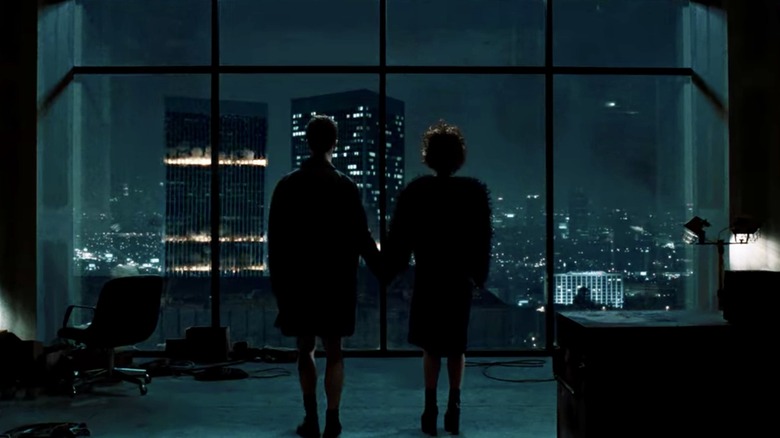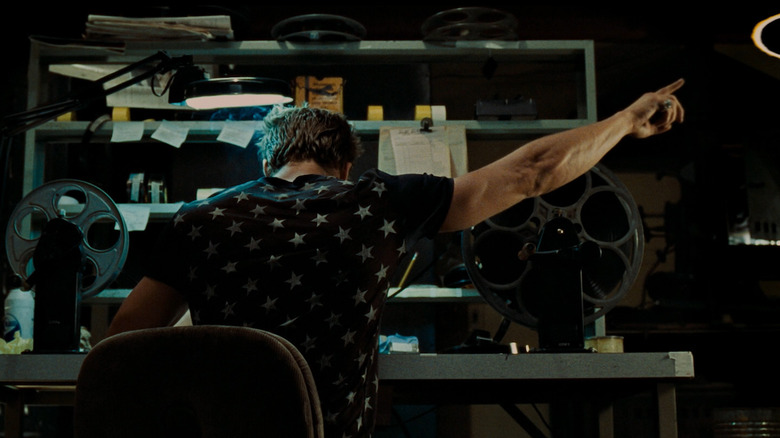China Restores Fight Club's Ending, Originally Censored To Remove The Explosions
With Beijing in the midst of hosting the 2022 Winter Olympics, all eyes are on China right now, which may be part of the reason why the Chinese streaming platform, Tencent Video, has reversed its decision to censor the ending of "Fight Club."
Late January brought news that Tencent had cut the film's original ending, in which the nameless narrator, nicknamed "Jack" (Edward Norton), holds hands with Marla (Helena Bonham Carter) and watches the towers of credit card companies explode. If you've seen the film, then you'll know that he planted the bombs that detonated the buildings while in the grips of his split personality, Tyler Durden (Brad Pitt). As the buildings fall, there are also flashes of male genitalia at the very end, in keeping with the joke about Tyler, the part-time projectionist and full-time anarchist, splicing frames of obscene footage into movies.
Per The Hollywood Reporter, one of the guiding principles of China's film censorship system is that "criminals must always be punished for their crimes onscreen and societal harmony restored." Owing to this, Tencent had inserted a caption in place of the usual "Fight Club" ending, reading:
"Through the clue provided by Tyler, the police rapidly figured out the whole plan and arrested all criminals, successfully preventing the bomb from exploding. After the trial, Tyler was sent to lunatic asylum receiving psychological treatment. He was discharged from the hospital in 2012."
Now, per THR, the streamer has done an about-face and restored 11 of the 12 minutes it cut from "Fight Club."
A Little Less 'Sport F***ing'
The only part of "Fight Club" that Tencent hasn't restored is about a minute of footage depicting Tyler and Marla's "sport f***ing," as he so charmingly calls it. Apparently, the film's anti-consumerist ending was deemed a lesser evil than the backlash to the censorship of it across the world.
Just last week, after the news broke of the changed ending, I revisited 'Fight Club" here in our Daily Stream column, and as I noted there, author Chuck Palahniuk had also spoken up about the censorship debacle. Screenwriter Jim Uhls and director David Fincher adapted "Fight Club" from Palahniuk's 1996 novel, and Palahniuk said that, ironically, the new Chinese ending adhered closer to his book, where Jack lands in a mental hospital at the end. Palahniuk also told TMZ (via Vanity Fair):
"What I find really interesting is that my books are heavily banned throughout the U.S. The Texas prison system refuses to carry my books in its libraries. A lot of public schools and most private schools refuse to carry my books. But it's only an issue once China changes the end of a movie. I've been putting up with book banning for a long time."
As THR observes, however, China also has a history of imposing heavier censorship than the U.S. when it comes to such things as depicting homosexuality. Fox allowed the country to remove any mention of homosexuality in "Bohemian Rhapsody." When Chloé Zhao won the Academy Award for Best Director last year, China also censored any online mention of her film, "Nomadland" — despite the fact that she is a Chinese citizen and was the first Asian woman to win the award — because of an old 2013 interview where she criticized the country's draconian censorship policies.

